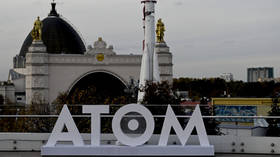Sanctioning Russian nuclear industry will cost EU billions – IAEA

The European Union is dependent on Russian uranium deliveries and sanctioning them would be unrealistic, International Atomic Energy Agency (IAEA) head Rafael Grossi said on Monday.
Grossi was in Brussels, briefing EU foreign ministers on the Iranian nuclear enrichment program when the question of possible nuclear sanctions against Russia came up during an exclusive interview with Reuters.
“Many companies in the West depend on Russian supplies – enriched uranium or fuel,” Grossi said. “The consensus is [that] sanctioning Rosatom would not be realistic and it’s impractical. It would put the nuclear industry at a standstill in many countries.”
Some EU member states have proposed extending the bloc’s embargo – imposed over the Ukraine conflict – to nuclear fuel sold by Moscow. Russia’s state-owned nuclear energy giant, Rosatom, owns nearly 50% of global uranium enrichment infrastructure and accounted for almost 36% of the world’s exports in 2022.
Rosatom is currently building more than 20 nuclear reactors around the world, from Türkiye and EU member Hungary to Egypt, China and India.
Last November, the US government noted a “gravely concerning” fact that almost 20% of nuclear fuel used by American power plants came from Russia. Assistant Secretary of Energy Kathryn Huff argued that it was “critical” for the US to end its “dependence” on Russia as a matter of national security and as a response to climate change. There have also been rumors of US plans to ban the import of Russian uranium starting in 2028.
Attempting to “reduce dependence” on Russian nuclear fuel would cost the EU billions and seemed unlikely, Grossi told Reuters. He also noted that global demand for enriched uranium was actually rising.
“Frankly, I see an increased presence of Russian uranium enrichment capabilities in the world rather than a decrease,” he told Reuters.
Grossi will soon visit Moscow and meet with Russian President Vladimir Putin before continuing to Tehran for talks with the Iranian government about their nuclear program.














